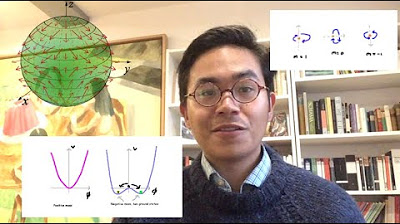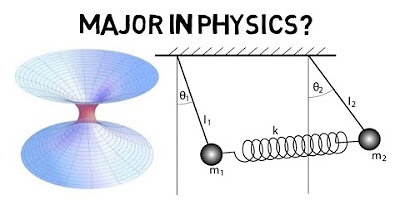So You Want To Be a Physics Major?
TLDRThe video script offers an insightful overview of the academic journey of obtaining a physics degree. It begins with introductory physics, emphasizing its challenging nature due to its importance for engineering students. As students progress, they delve into experimental physics, modern physics introducing quantum mechanics and relativity, and mathematical methods essential for understanding the field. Upper-level courses like electrodynamics, statistical mechanics, and quantum mechanics further the understanding of fundamental concepts, with computational physics and senior thesis providing practical research experience. The script highlights the rigorous mathematical foundation required for advanced physics studies and the importance of internships for career competitiveness.
Takeaways
- 📘 Physics degree requires a variety of classes, often repetitive in nature.
- 🌟 Introductory physics is split into two semesters: Newtonian mechanics and electricity & magnetism.
- 🔍 The difficulty of introductory physics is intentional to ensure a strong grasp of basics for future engineering students.
- 🧪 Second year physics students typically take courses in experimental physics and circuits.
- 🌌 Modern physics class introduces Quantum Mechanics, Special Relativity, Atomic and Nuclear Physics.
- 📚 'Mathematical Methods of Physics' exposes students to the mathematical branches associated with physics.
- 🔧 Classical Mechanics course deepens understanding of Newton's Laws and requires familiarity with multivariable calculus.
- 🌠 300-level electives vary by university; examples include astrophysics and other specialized topics.
- 💡 Electromagnetism is a challenging two-semester course assuming fluency in vector and multivariable calculus.
- 🌡️ Statistical and Thermal Physics courses differ from those taken by engineering students, focusing on microscopic descriptions.
- 🔬 Quantum Mechanics is a two-part class exploring one-dimensional and multi-dimensional quantum systems.
Q & A
What is the first course one typically takes when pursuing a degree in physics?
-The first course one typically takes is introductory physics, which is usually split into two semesters covering Newtonian mechanics and electricity and magnetism.
Why is introductory physics considered difficult?
-Introductory physics is considered difficult because it aims to ensure that students, primarily engineering students, have a solid understanding of the basics before moving on to more advanced topics. The difficulty is also due to the mathematical rigor required.
What are some of the experiments one might perform in an experimental physics course?
-In an experimental physics course, students might perform historical experiments like the double-slit experiment and work with magnetic or muon detection, which are straightforward for undergraduates.
What topics are introduced in a modern physics class?
-A modern physics class introduces Quantum Mechanics, Special Relativity, Atomic Physics, Nuclear Physics, and sometimes Statistical Mechanics. It serves as a transition for students considering graduate studies.
What math classes are associated with physics?
-Math classes associated with physics include vector calculus, linear algebra, differential equations, and complex variables. These are essential for solving physics problems and understanding advanced concepts.
How does the classical mechanics course differ from introductory physics?
-The classical mechanics course is more advanced, focusing on Newton's Laws as a series of differential equations and requiring familiarity with various coordinate systems. It assumes prior knowledge of multivariable calculus.
What are the key math branches important for upper-level physics classes?
-Multivariable calculus and differential equations are the most important branches of math for upper-level physics classes, as they are essential for theories like electrodynamics and descriptions of phenomena like the harmonic oscillator.
What skills are developed in an experimental physics class?
-In an experimental physics class, students develop skills in writing rigorous lab reports, programming languages, and using professional writing standards, similar to preparing a paper for publication.
Why is electrodynamics considered one of the most difficult physics classes?
-Electrodynamics is considered difficult because it demands fluency in vector and multivariable calculus, as well as the ability to work with different coordinate systems and apply these concepts to three-dimensional charges and fields.
How does statistical mechanics differ from thermodynamics for engineering students?
-Statistical mechanics differs from the thermodynamics taken by engineering students in that it starts with a microscopic perspective rather than a macroscopic one, focusing on predictions and probabilities at the particle level rather than macroscopic properties of systems.
What is the significance of a senior thesis in physics?
-A senior thesis in physics is significant as it allows students to engage in research under the guidance of a professor, presenting their findings to a general audience and gaining valuable experience in the field before graduation.
Outlines
📘 Introduction to Physics Degree and Coursework
This paragraph introduces the viewer to the variety of classes one would encounter while pursuing a degree in physics. It emphasizes the repetitive nature of physics education, with a focus on introductory physics courses split into two semesters. The first semester covers Newtonian mechanics and projectile motion, while the second delves into electricity, magnetism, and circuit analysis. The difficulty of introductory physics is attributed to the need for a strong foundation in basic principles, especially for students heading into engineering. The speaker also mentions the progression into more advanced classes after the first year, including experimental physics and modern physics, which introduces concepts like quantum mechanics and special relativity.
🧪 Upper-Level Physics and Mathematics Courses
The second paragraph discusses the upper-level physics and mathematics courses that are crucial for a physics degree. It highlights the importance of multivariable calculus and differential equations in understanding advanced physics concepts. The speaker describes the experimental physics course, which includes learning to write rigorous lab reports and potentially picking up programming languages. Electrodynamics is introduced as a challenging two-semester class that requires fluency in vector and multivariable calculus. The paragraph also touches on statistical and thermal physics, emphasizing the shift from macroscopic to microscopic perspectives and the predictive power of statistical mechanics. Quantum mechanics is previewed, noting its mathematical complexity and the famous thought experiment of Schrödinger's cat.
🎓 Final Years of Physics Degree and Electives
The final paragraph focuses on the later stages of a physics degree, including the selection of 400-level electives and the computational physics course. It discusses the importance of internships for gaining practical experience and standing out in a competitive field. The speaker also talks about the senior thesis, which involves undertaking a project or research under the guidance of a professor. The thesis helps students present their findings to a general audience, marking the culmination of their undergraduate physics education.
Mindmap
Keywords
💡Physics Degree
💡Newtonian Mechanics
💡Electricity and Magnetism
💡Quantum Mechanics
💡Relativity
💡Electrodynamics
💡Classical Mechanics
💡Experimental Physics
💡Statistical Mechanics
💡Computational Physics
💡Senior Thesis
Highlights
Introductory physics is split into two semesters, starting with Newtonian mechanics and projectile motion.
The second semester of introductory physics covers electricity, magnetism, and circuit analysis.
Introductory physics is notoriously difficult due to the need for a strong foundation in basic concepts for future studies.
In the second year, students take courses in experimental physics and learn to build sophisticated circuit boards.
Modern physics is the cutoff course that introduces Quantum Mechanics and Special Relativity.
Mathematical Methods of Physics exposes students to the various branches of math associated with physics, such as vector calculus and linear algebra.
Classical Mechanics involves writing Newton's Laws as differential equations and using multivariable calculus.
300-level electives vary by university, with options like astrophysics and other specialized fields.
Electrodynamics is a challenging two-semester course that assumes fluency in vector and multivariable calculus.
Statistical and thermal physics courses differ from those taken by engineering students, focusing on microscopic descriptions and real-number calculations.
Quantum Mechanics is introduced with the Copenhagen interpretation and the concept of wave functions.
400-level physics electives can range from atomic physics to computational physics, with the latter teaching problem-solving through programming.
Summer internships are crucial for physics students to gain practical experience and stand out in the competitive job market.
A senior thesis involves working on a professor's research project and presenting findings to a general audience.
Physics students are often interested in advanced topics like black holes, string theory, and general relativity, rather than just projectile motion.
The difficulty of introductory physics is intentional to ensure engineering students have a solid understanding before progressing.
The study of electrodynamics involves understanding the dynamics of moving charged bodies and the principles of special relativity.
Statistical mechanics is considered a highly accurate theory that makes real predictions, even more so than quantum mechanics and relativity.
Transcripts
Browse More Related Video

The Math You Need to Study Theoretical Physics!

What does a Physics major do? (Part 1: Curriculum and Subfields)

The Complete Physics Major Guide (college classes, internships, career paths)

Hardest Physics Classes I've Taken in Undergrad

Physics Vs Math - How to Pick the Right Major

What Math Classes Do Physics Majors Take?
5.0 / 5 (0 votes)
Thanks for rating: